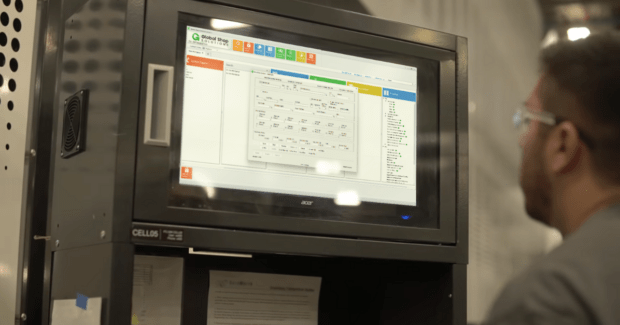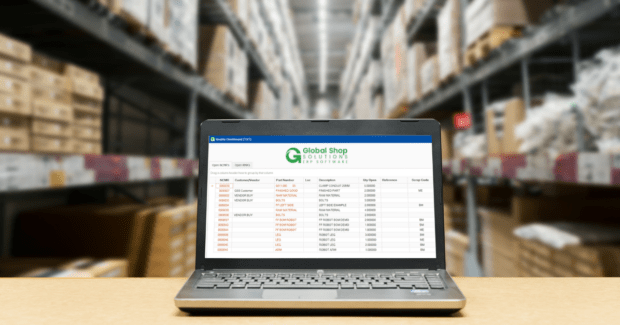10 Areas Manufacturers Might See an Impact from AI
The ability of AI to concurrently look into the past, present, and future provides unprecedented possibilities for manufacturers.
Posted: April 22, 2024

Few technologies have transformed the manufacturing industry like ERP software. By providing real-time data, automating production processes, integrating with third-party software, and communicating with the Internet of Things (IoT), ERP has changed the way manufacturers run their entire businesses.
Although fairly new on the scene, artificial intelligence (AI) and machine learning (ML) are already having a strong impact by changing the way manufacturers collect, process and analyze data. AI’s ability to learn from data in the ERP system and outside sources enables decision-makers to formulate deeper and more accurate predictions regarding customers, buying habits, inventory levels, markets, material purchasing and more. When customer needs, markets and entire industries can change overnight, conducting data-based forecasting is vital for long-term success — and AI can provide it.
Computer Self-learning at Your Service
The magic of AI enables machines to learn from experience so they can adapt to new inputs and perform tasks that have historically been performed by humans. That doesn’t mean AI can accomplish tasks without human guidance. It needs people to program the system to recognize patterns and ask the right questions.
When programmed correctly, AI can automate repetitive learning, add intelligence to existing products, and achieve incredible accuracy through deep neural networks. It can even adapt itself through progressive learning algorithms so the data can do the programming. When AI algorithms become self-learning, the data becomes an extremely valuable asset.
10 Ways AI Can Make Your Manufacturing Better
- Proactive Inventory Management
Managing inventory is mostly a reactive process. AI makes it more proactive by increasing visibility of inventory KPIs; improving product, channel and location forecasting; automatically classifying SKUs to identify what’s needed to meet demand; and replenishing SKUs faster with predictive ordering based on anticipated changes in supply and demand. AI-integrated ERP optimizes inventory by predicting demand, identifying slow-moving products, and automating order fulfillment. It can reduce inventory levels by up to 50%.
- Real Time Quality Control
AI-based inspection systems can identify defects and anomalies in manufacturing processes in real time, thereby reducing the risk of product recalls and improving overall quality. AI’s image recognition algorithms can analyze images of products on the assembly line to identify defects that the human eye is unable to detect. With its deep learning capabilities, AI-powered quality control software can self-learn which aspects are vital and create rules that determine the features needed to define quality products.
- Pricing Optimization
Manufacturers can optimize pricing by using AI data to analyze market trends, competitor pricing, and customer behavior, resulting in higher profits and better customer satisfaction. AI’s deep data dives allow you to use historical sales data to model how customers will respond to price changes, factor customer behavior into pricing strategies, and combine experience and data to increase prices without damaging sales. AI predictions aren’t 100% accurate, but they do provide a data-based foundation for effective pricing strategies.
- Demand Forecasting
AI helps optimize production schedules, reduce lead times, and avoid stockouts by predicting product demand based on historical data, market trends, and customer behavior. It enables forecasting of consumer demand for every SKU, and its unique ability to engage in near-term demand sensing lets you create forecasts based on current supply chain conditions. AI can create a holistic view of demand across your entire enterprise by combining supply, sales, finance and marketing projections.
- Supply Chain Management
Supply chain disruptions can cause serious problems. AI-powered ERP helps control supply chain management by predicting supplier lead times, identifying bottlenecks, and optimizing logistics routes. Using algorithms to predict which products will be in demand and in what quantities, AI reduces strains on specific links of your supply chain. It can also enhance warehouse supply and demand management by improving the health and longevity of your transportation vehicles, making loading processes more efficient, reducing costs and increasing revenues.
- Predictive Maintenance Scheduling
Proper maintenance is essential to minimizing labor downtime, reducing repair costs and extending the life of your machines and equipment. You can achieve these goals by using AI to predict equipment failure and schedule preventative maintenance before a breakdown occurs. In addition to protecting your machines and equipment, AI can reduce quality defects, increase efficiency and productivity and improve safety by minimizing human errors and accidents.
- Labor Management
Labor costs are often the biggest line item in the manufacturing budget. AI-powered ERP can help reduce labor costs and increase productivity by predicting employee productivity, identifying training needs and optimizing scheduling. It alleviates workplace injuries by automating risky processes and limiting shop floor personnel’s exposure to powerful, unwieldy machinery and dangerous tasks.
- Data-driven Decisions with Real Time Analytics
ERP software provides real time data. AI-powered ERP provides real time analytics on key performance indicators such as production rates, inventory levels and quality metrics. AI processes data from different sources and presents it in a consistent manner, making it easier to structure the data for analysis. It organizes and distributes IoT data faster and with greater precision than conventional data analysis methods, and speeds up real time analytics by preparing, analyzing and assessing data as soon as it is available.
- Labor Shortages
AI applications can help with labor shortages through robotic automation, additive manufacturing and machine vision. To overcome the tendency of highly skilled designers and engineers to use a “best guess” approach when creating design solutions, AI empowers the development of complex designs that can be accurately produced with 3D printing. AI-driven autonomous machine vision can count and track items, identify defects, and properly sort products using cameras and specific lighting conditions.
- Autonomous Manufacturing
One of AI’s strongest points is reducing the need for human intervention by automating manufacturing processes. AI robots tap into machine learning algorithms to automate repetitive tasks like data entry and order processing. They also manage more complex tasks such as spotting anomalies on the production line. Further, AI-powered robots can work side-by-side with humans. Autonomous mobile robots can transport packages within the warehouse and collaborative robots (cobots) can assemble products alongside humans on the production line. These factory robots take product quality to new levels by combining the precision and efficiency of machines with the skills and intelligence of human operators.
The complexity of AI algorithms and their ability to gather and analyze mountains of data provided by ERP and other sources can be daunting. Yet, their ability to concurrently look into the past, present, and future provides unprecedented possibilities for manufacturers.

















